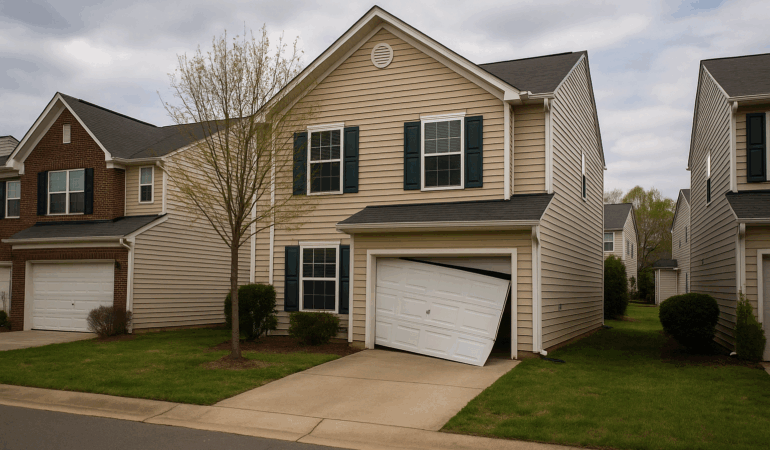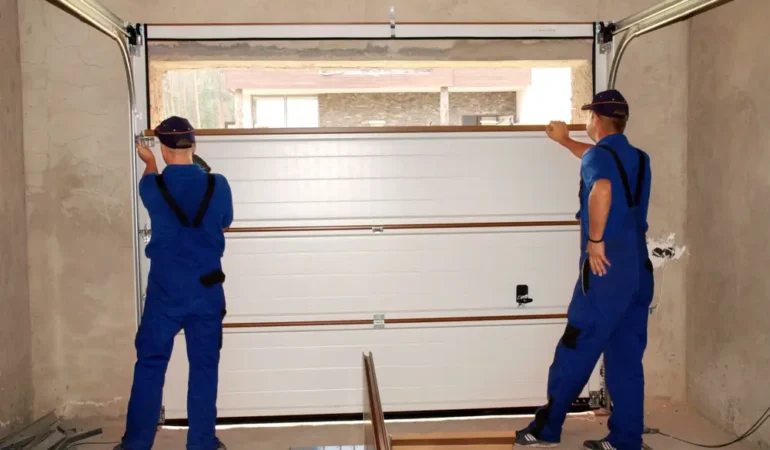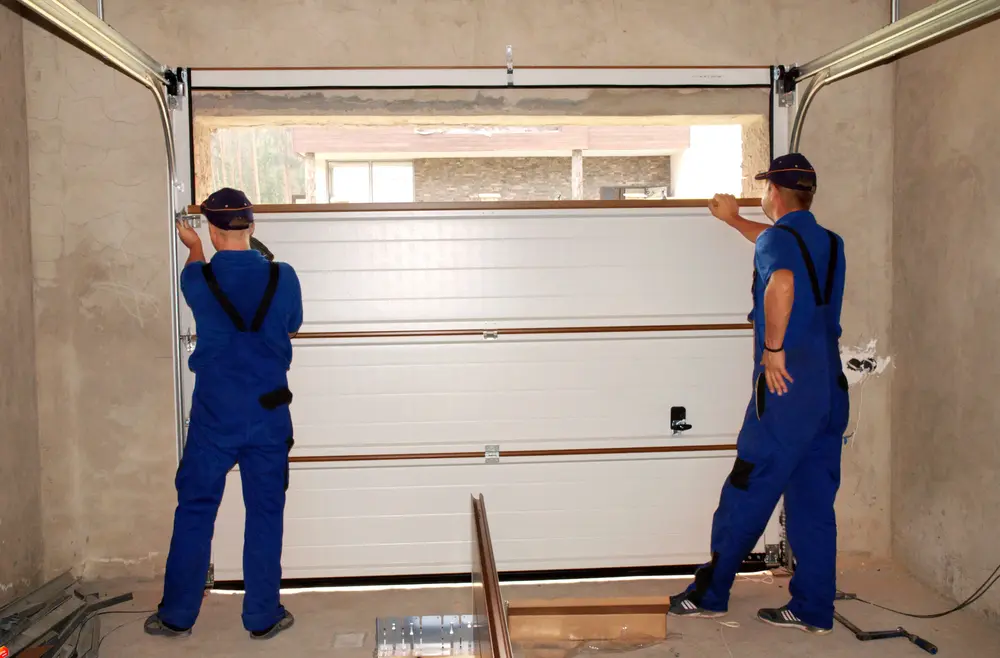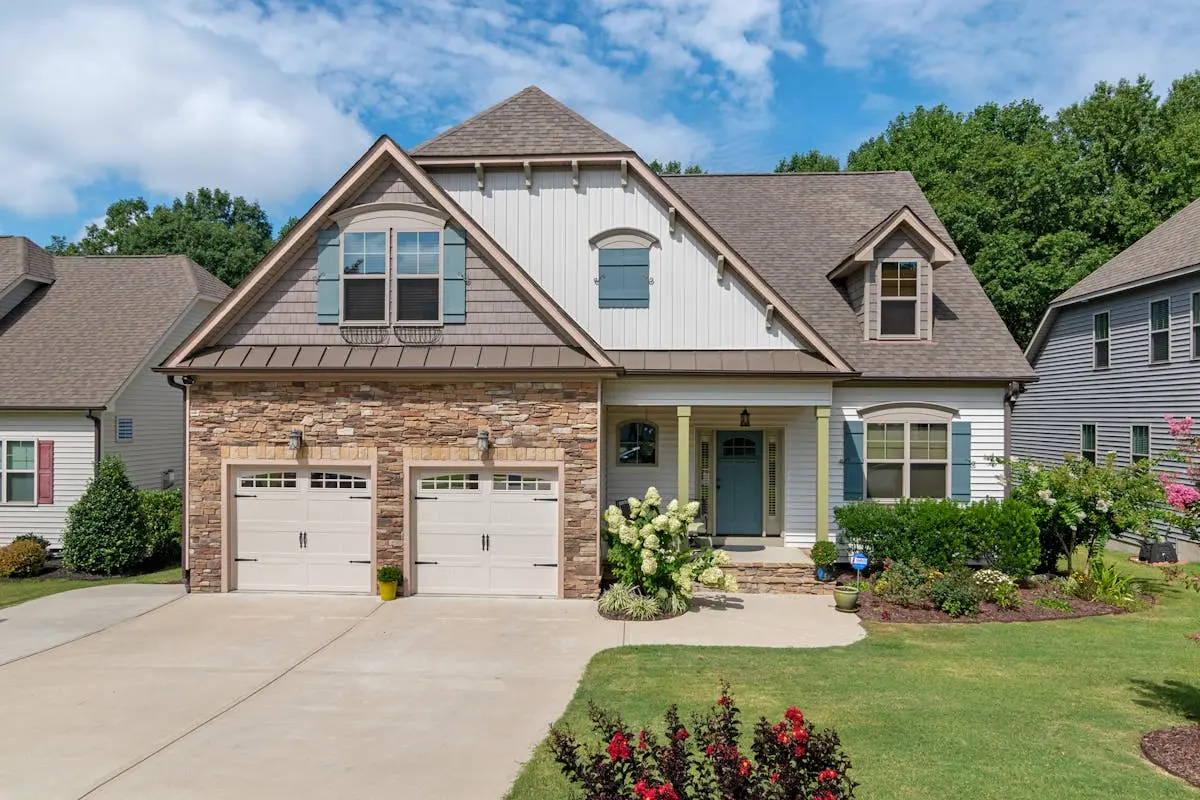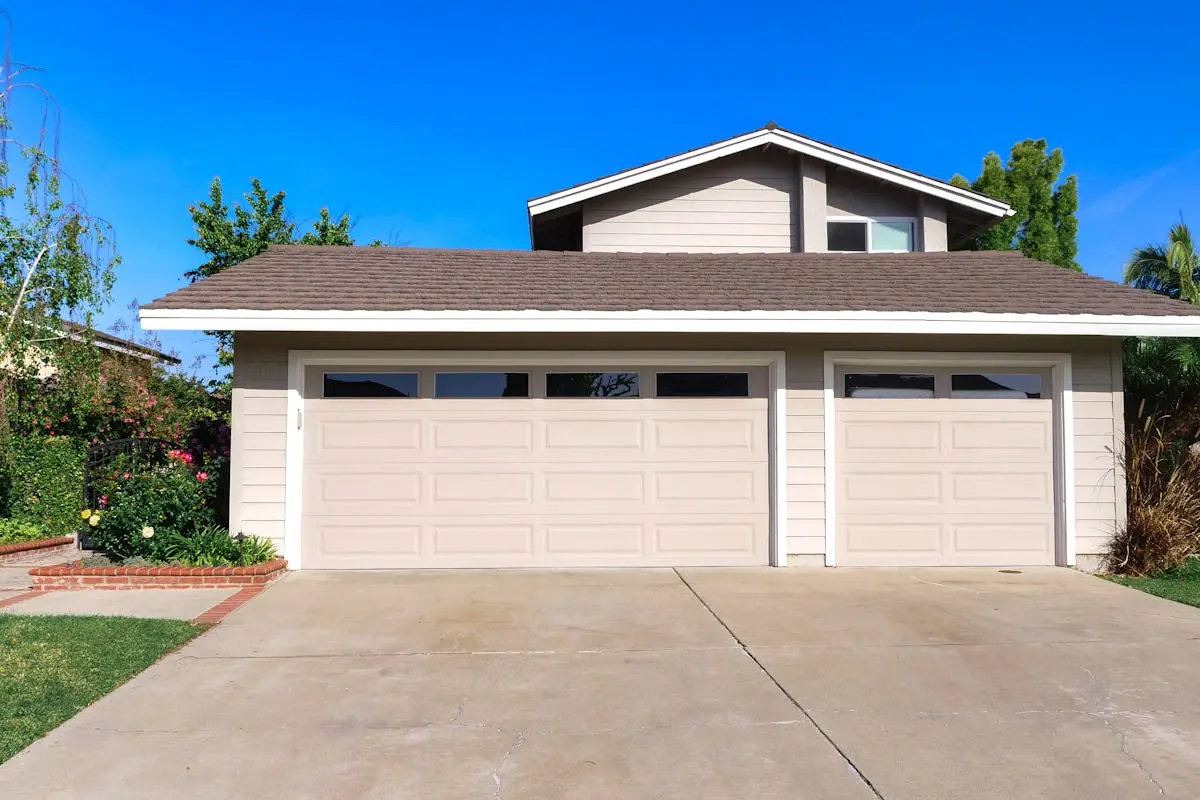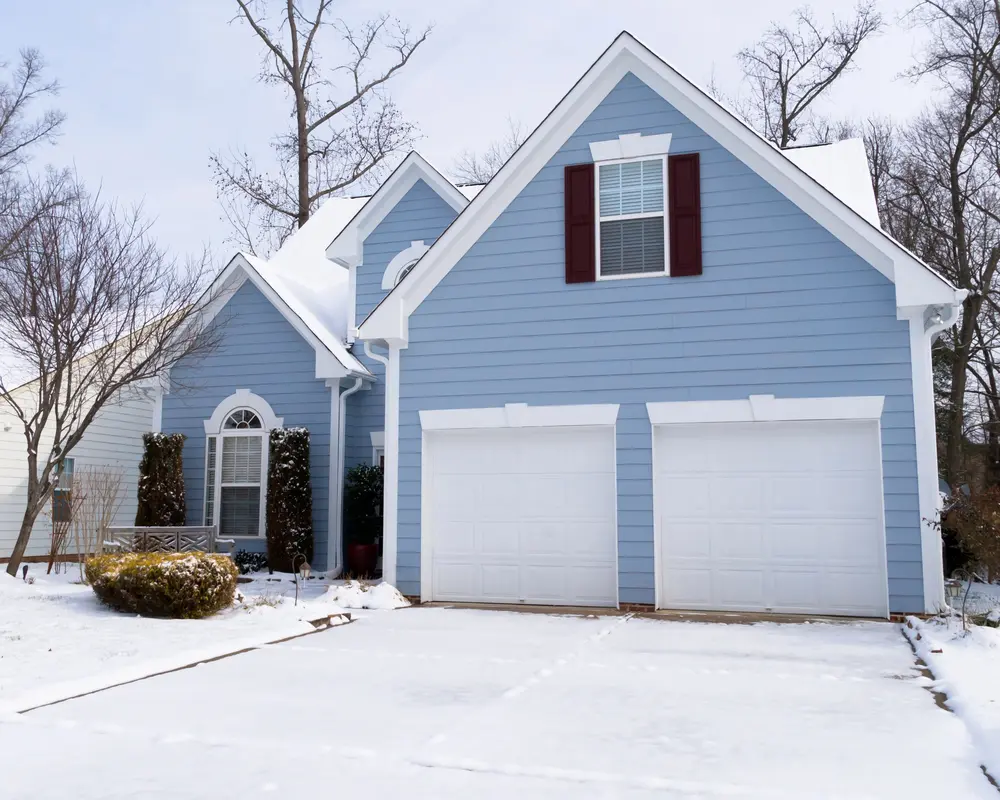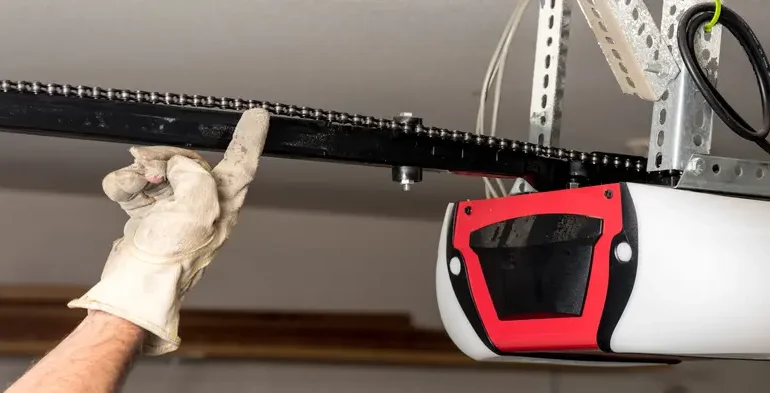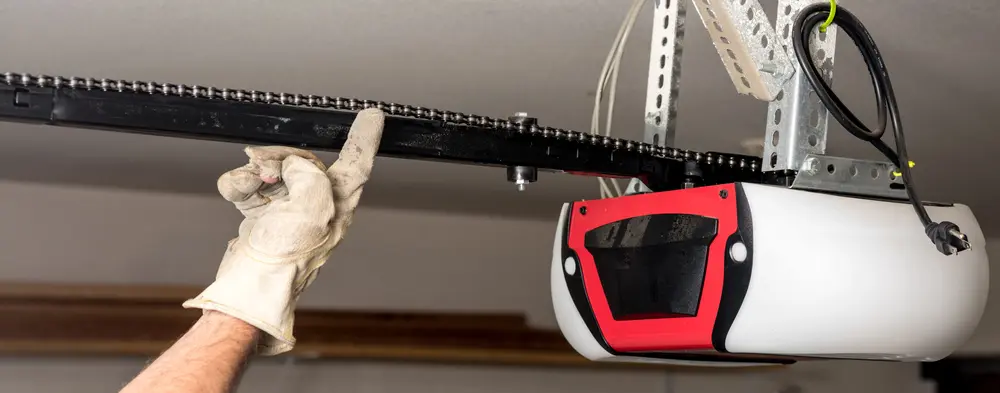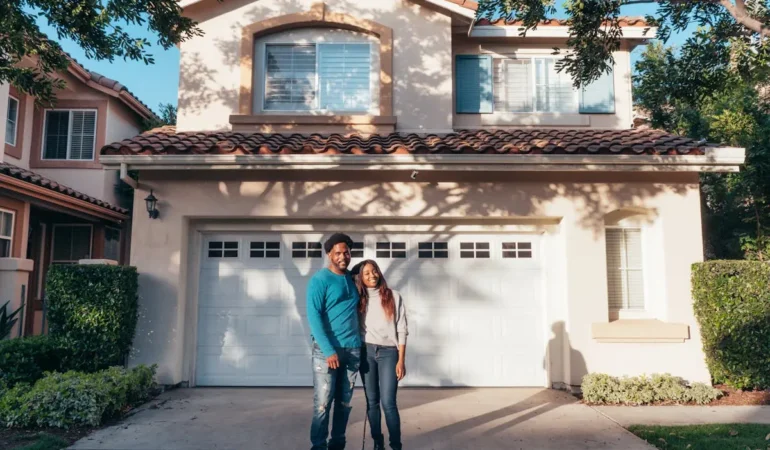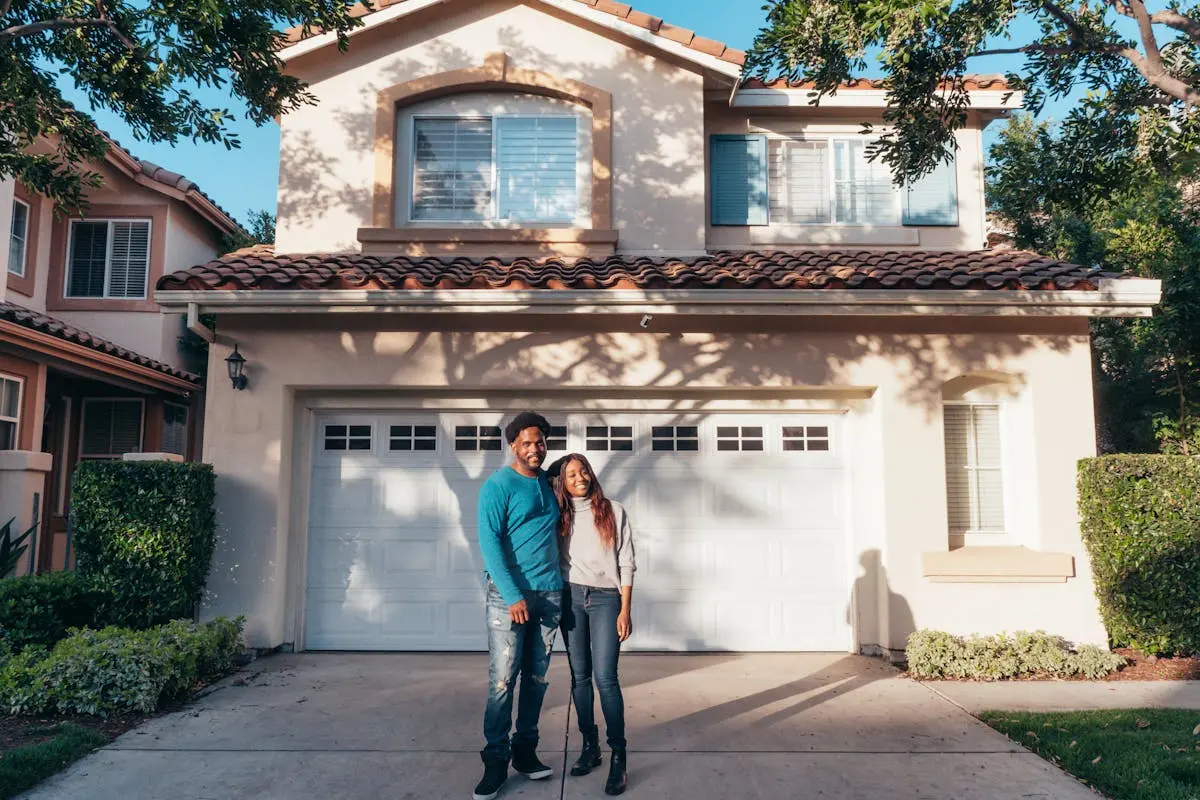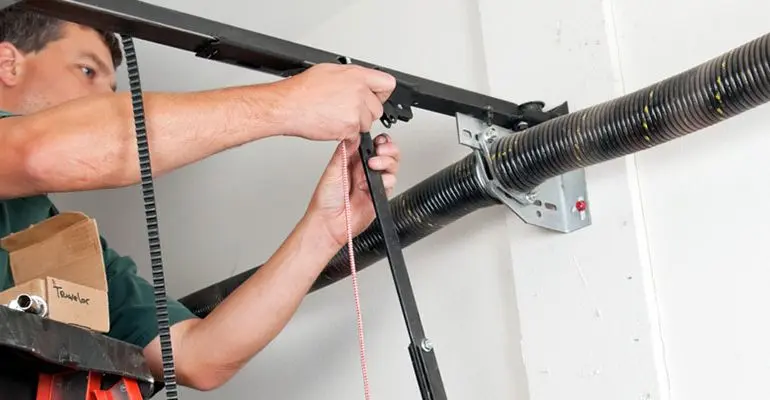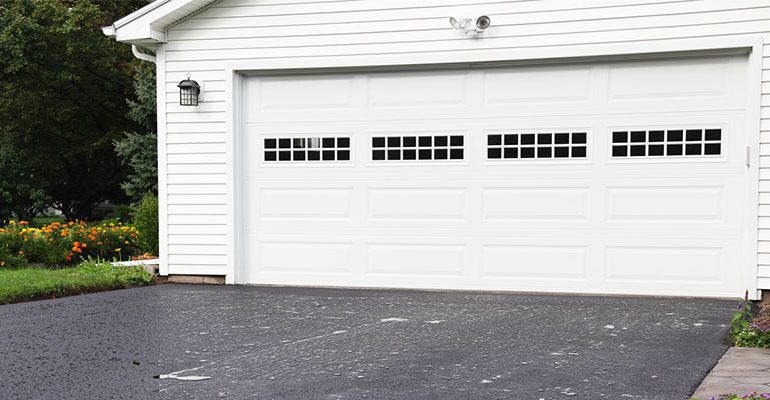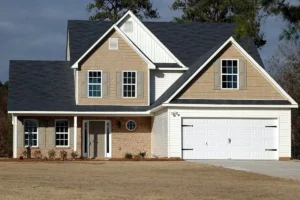As homeowners, we often overlook the importance of our residential garage doors until they start to malfunction. A well-functioning garage door is crucial for the security and functionality of our homes.
If you’re experiencing issues with your garage door, it may be time to consider garage door replacement or repair. At Garage Door Expert Service, we have the expertise to guide you through the process. You can contact us at 704-966-4128 for a free estimate.
Understanding when to repair or replace your garage door can be challenging. In this article, we’ll explore the signs that indicate your garage door needs garage door installation or replacement, and the benefits of upgrading to a new one.
Signs Your Garage Door Needs Immediate Attention
It’s important to know when your garage door is failing. This is key for keeping your home safe and secure. A garage door nearing the end of its life will show warning signs that you can’t ignore.
Unusual Noises and What They Indicate
Strange noises when your garage door moves can mean trouble. Sounds like grinding, scraping, or squeaking might point to worn-out parts or misalignment. Regular garage door maintenance can catch these issues early.
Visible Physical Damage Assessment
Wear and tear on your garage door, like dents, cracks, or rust, can weaken it. It’s vital to check how bad the damage is. This will help decide if you need a garage door repair or a new one.
| Type of Damage | Possible Cause | Recommended Action |
|---|---|---|
| Dents and Cracks | Impact or Wear | Inspect for structural integrity |
| Rust | Moisture Exposure | Apply rust-resistant coating |
Operational Issues That Shouldn’t Be Ignored
If your garage door has trouble opening or closing, it’s a red flag. Problems like uneven movement or getting stuck might mean issues with balance or track alignment. These are critical signs of garage door failure.
Knowing these signs can help you act fast. This ensures your home stays safe and secure.
The Safety Risks of Postponing Garage Door Replacement
Not replacing your garage door can be very dangerous. An old or broken garage door can make your home less safe. It also puts your family at risk.
Potential Hazards to Family Members
Old or damaged garage doors can be dangerous, especially for kids. Some dangers include:
- Risk of Injuries: Doors that fall or don’t work right can hurt people badly.
- Entrapment: Old doors might not have safety features like auto-reverse. This can trap people.
For tips on keeping your garage door safe, check out our maintenance tips.
Security Vulnerabilities for Your Home
Waiting to replace your garage door can make your home less secure. Some risks include:
- Potential for Theft: A weak garage door is an easy way for burglars to get in.
- Property Damage: A broken garage door can also cause damage to your property. This could be from forced entry or bad weather.
Getting a new, secure garage door can make your home safer. It’s a good idea to get one with the latest security features.
How Age Affects Your Garage Door’s Performance
The age of your garage door is key to its efficiency and safety. As doors get older, parts can wear out. This can lead to less performance and safety risks.
Average Lifespan of Different Garage Door Types
Garage doors vary in lifespan. For example, steel garage doors can last 20 to 30 years with care. On the other hand, wooden garage doors may need to be replaced every 15 to 20 years. This is because wood can rot and warp.
Knowing how long your garage door type lasts can help you plan for when it might need to be replaced.
| Garage Door Type | Average Lifespan |
|---|---|
| Steel | 20-30 years |
| Wooden | 15-20 years |
| Aluminum | 20-25 years |
Maintenance History and Its Impact on Longevity
Regular maintenance can make your garage door last longer. Tasks like lubricating parts and checking for wear can prevent early damage. For more tips on keeping your garage door in good shape, check out our guide on garage door maintenance.
Keeping a maintenance log can help your garage door run smoothly for years.
Understanding how age impacts your garage door’s performance helps you decide when to replace it. This ensures your door stays safe and efficient.
Rising Energy Bills? Your Garage Door Might Be the Culprit
Are your energy bills going up? It might not be your appliances. An old or worn-out garage door can really hurt your home’s energy efficiency. This can lead to higher utility costs.
How Outdated Doors Affect Home Insulation
Old garage doors often don’t insulate well. This lets cold air in during winter and hot air in during summer. Your heating and cooling systems have to work harder, using more energy. A poorly insulated garage door can be a big energy waster.
Energy-Efficient Options for Replacement
Getting a new garage door can lower your energy bills. Today’s garage doors are made to keep your garage and living areas comfy. Look for these features in energy-efficient garage doors:
- High R-value insulation for better thermal resistance
- Weatherstripping to prevent air leaks
- Durable materials that withstand various weather conditions
| Insulation Type | R-Value | Energy Savings |
|---|---|---|
| Polyurethane | R-10 to R-12 | Up to 30% |
| Polystyrene | R-6 to R-8 | Up to 20% |
| No Insulation | R-0 | 0% |
Upgrading to an energy-efficient garage door makes your home more comfy and saves on energy bills. It’s a smart move for a more sustainable and cost-effective home.
Aesthetic Considerations: When Your Garage Door Hurts Your Curb Appeal
Your garage door’s look is key to your home’s curb appeal. An old or worn-out garage door can make your home look less appealing. We often forget about the garage door when thinking about our home’s look. But, it’s a big part that can make or break your home’s appearance.
Signs of Outdated Design and Wear
An outdated or worn-out garage door can hurt your home’s look. Look for faded colors, rusty or broken hardware, and a worn-out look. If your garage door looks old or is in bad shape, it’s likely making your home look less attractive.
Current Garage Door Style Trends
Today, garage doors are all about clean lines, simple designs, and natural materials like wood. If you want to improve your home’s look, check out current garage door style trends.
How a New Door Can Transform Your Home’s Appearance
A new garage door can really change your home’s look, making it more appealing and possibly increasing its value. By picking a modern design that fits your home’s exterior, you can make your property more welcoming and attractive.
| Garage Door Style | Characteristics | Impact on Curb Appeal |
|---|---|---|
| Traditional | Classic design, often with raised panels | Timeless appeal, suitable for most homes |
| Modern | Clean lines, minimal ornamentation | Enhances contemporary home designs |
| Carriage House | Simulates a carriage house door, often with hardware | Adds a rustic, charming appeal |
Knowing when your garage door is outdated and keeping up with style trends can help you improve your home’s curb appeal.
The Complete Guide to Garage Door Installation and Replacement
Building a new home or upgrading your garage door? Knowing the installation process is key. Replacing a garage door needs careful thought and expert help for safety, security, and looks.
Professional vs. DIY Installation: What You Need to Know
Homeowners face a big choice: DIY or professional installation for garage doors. DIY might save money, but garage door installation needs special tools and skills. Professional installation means the job is done right, safely, and fast.
- Professional installers have the right experience and training.
- They can handle complex jobs and repairs.
- Professional installation usually comes with a warranty.
The Replacement Process Explained Step-by-Step
The garage door replacement process has several steps:
- Checking the current garage door and parts.
- Picking a new garage door and hardware.
- Removing the old garage door.
- Putting in the new door, springs, and hardware.
- Testing and adjusting the new door.
Average Timeline for Professional Installation
The time for professional garage door installation varies. It depends on the job’s complexity and the installer’s schedule. Simple replacements usually take a few hours. More complex ones might take longer.
Understanding the garage door installation and replacement process helps homeowners make smart choices. This ensures their new garage door is installed correctly and efficiently.
Types of Garage Doors: Finding Your Perfect Match
Garage doors come in many types, each with its own benefits. Homeowners need to think about material, style, and function to choose the right one. This ensures the garage door fits their needs perfectly.
Material Options and Their Benefits
The material of your garage door affects its durability and upkeep. It also changes how it looks. Here are some common materials:
- Steel: Steel doors are durable and easy to maintain. They can also be insulated for better energy use.
- Wood: Wooden doors give a classic look. They need more care than steel but can be painted or stained.
- Aluminum: Aluminum doors are light and don’t rust, great for coastal areas.
- Fiberglass: Fiberglass doors are strong and look like wood. They also resist dents and rust.
Style Choices to Complement Your Home
The style of your garage door can really make your home look better. Here are some popular styles:
- Traditional: These classic designs fit most homes well.
- Modern: Sleek designs are perfect for modern homes.
- Carriage House: These doors look like old carriage houses, adding charm.
Weather Considerations for Door Selection
Your local weather is key in picking the right garage door. For example:
- In coastal areas, choose doors that resist saltwater damage, like aluminum or fiberglass.
- In areas with very hot or cold temperatures, insulated doors help keep your garage comfortable. This can save on energy costs.
Thinking about these points helps homeowners pick a garage door that looks good and works well. It also stands up to local weather.
Smart Technology Integration for Modern Garage Doors
Modern garage doors are more than just entry points. They’re key parts of our smart homes. They bring better security, ease, and home function.
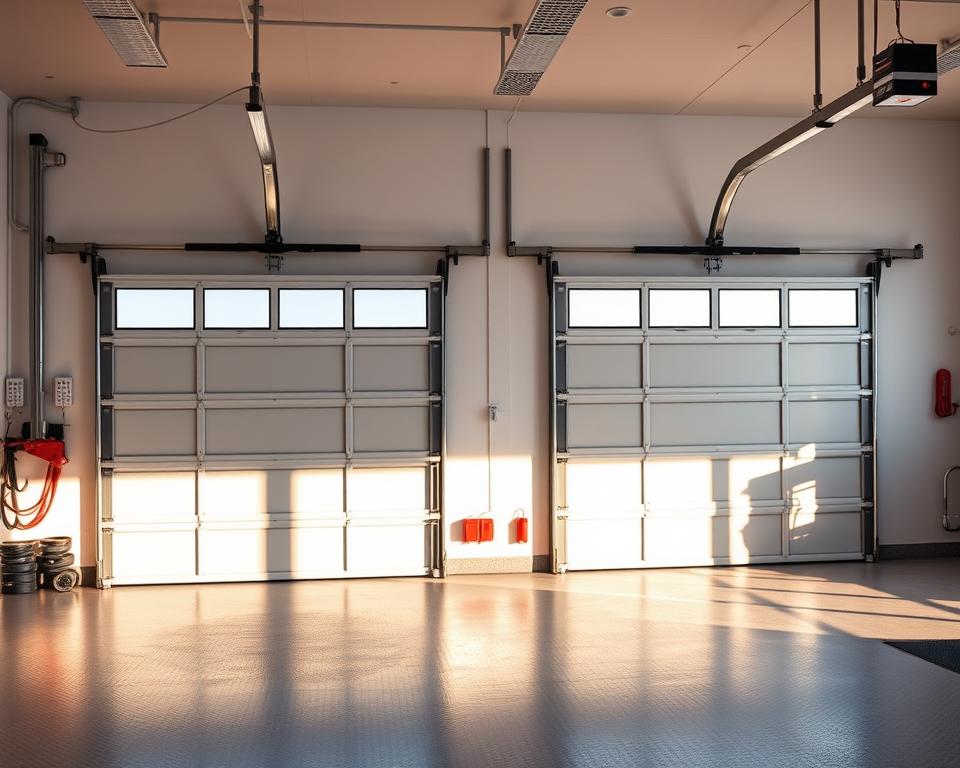
Remote Access and Security Features
Smart garage doors let you control them from anywhere. With a smartphone app, you can open or close your garage door. This is handy for letting family or service providers in when you’re out.
They also have top-notch security. You get alerts if the door is open or if someone tries to mess with it.
Compatibility with Home Automation Systems
Smart garage doors work well with home automation systems. This makes them easy to add to your smart home setup. You can control your garage door with other smart devices like lights and thermostats.
This integration makes managing your home easier. It’s all about convenience and control.
Future-Proofing Your Garage Door Investment
Getting a smart garage door is smart for the future. As tech gets better, your garage door can too. It keeps up with your needs and stays useful.
This flexibility is key. It makes your garage door last longer and stay a valuable part of your smart home.
Cost Factors in Garage Door Replacement
Replacing a garage door involves many factors, like materials and labor. Knowing these can help homeowners make smart choices.
Breaking Down the Investment: Materials, Labor, and Extras
The cost of replacing a garage door includes materials, labor, and extra features. Materials can be simple steel or fancy wood, changing the price. Labor costs depend on where you live, the installer’s skill, and how hard it is to install. Additional features like smart tech, insulation, and fancy hardware add to the price.
| Component | Cost Range | Description |
|---|---|---|
| Materials | $800 – $3,000 | Includes the garage door itself, ranging from basic steel to custom wood. |
| Labor | $200 – $1,000 | Cost of professional installation, varying by location and complexity. |
| Additional Features | $100 – $1,000 | Extras like smart technology, insulation, and decorative elements. |
Financing Options Available
There are many financing options for garage door replacement. You can look into loans, credit plans, or programs from manufacturers. It’s key to compare these to find the best one for your budget.
Long-Term Value and Return on Investment
Getting a new garage door can really boost your home’s value and energy use. A modern, well-insulated door can save you money on energy and might even raise your home’s resale value. Think about energy savings, better looks, and more security when figuring out the investment.
How to Choose a Reliable Garage Door Installation Company
Finding a good garage door installation company is key for a smooth replacement. The installer you pick can greatly affect the quality of the job and your happiness.
Credentials and Experience to Look For
When looking for a garage door installer, check their credentials and experience. Make sure they are licensed, insured, and certified by industry groups. A company with a long history of good installations is usually more trustworthy.
Look at how long they’ve been in business and their skill with different garage doors.
Reading Reviews and Checking References
Reading reviews from past customers is a great way to see if a company is reliable. Look up reviews online and ask for references. This will help you understand their quality and service.
Questions to Ask Before Hiring
Before you decide, ask the companies you’re considering some important questions. Here are a few:
- What experience do you have with garage doors like mine?
- Can you give me a detailed cost estimate?
- How long will the installation take?
- Do you offer any warranties or guarantees?
By looking at their credentials, reading reviews, and asking the right questions, you can find a reliable garage door installer. They will meet your needs.
Maintenance Tips to Extend Your New Garage Door’s Life
Regular upkeep is key to keeping your garage door in top shape. It helps avoid expensive fixes. By following simple maintenance tips, your garage door will keep working well.
Seasonal Maintenance Checklist
Seasonal checks can spot problems early. Here’s a basic checklist:
- Inspect the garage door’s balance and alignment.
- Lubricate moving parts such as hinges and rollers.
- Check the condition of the weatherstripping and replace if necessary.
- Tighten any loose hardware.
Seasonal maintenance keeps your garage door running smoothly and safely.
When to Call Professionals vs. DIY Maintenance
Some tasks you can do yourself, but others need a pro. DIY tasks include lubricating parts and tightening hardware. But, complex jobs like spring replacement need a pro.
Knowing your limits is important to avoid accidents or damage to your garage door.
Warranty Considerations and Coverage
Understanding your garage door’s warranty is crucial. Most warranties cover parts and labor for a set time. Keeping maintenance and repair records can help with warranty claims.
Take the Next Step Toward Your Garage Door Upgrade Today
Now you know when it’s time for a new garage door. A modern door boosts your home’s look and makes it safer and more energy-efficient.
At our company, we know how crucial a good garage door is. We offer top-notch replacement services for a smooth installation. Just contact us online or call 704-966-4128 for a free estimate.
Our team is here to help you find the right garage door. We aim to meet your needs and budget. Let us help you upgrade your garage door today for better performance and service.
Ready to upgrade your garage door? Contact us now for a free estimate and expert replacement services.
FAQ
What are the signs that my garage door needs to be replaced?
Look for unusual noises, visible damage, and operational issues. If your garage door makes strange noises, has damage, or has trouble opening and closing, it’s time to think about replacing it.
How long do garage doors typically last?
Garage doors last between 15 to 30 years, depending on the type and material. Regular maintenance can help extend its life.
Can an old garage door affect my energy bills?
Yes, an old garage door can make your home less energy-efficient. This can increase your energy bills. A new, energy-efficient garage door can help save money.
What are the benefits of installing a new garage door?
A new garage door can make your home look better, improve security, and save energy. It also gives your home a modern look.
Should I replace my garage door myself or hire a professional?
DIY installation is possible, but we suggest hiring a professional. They have the right skills and tools for a safe, proper installation.
What types of garage doors are available?
We offer different types of garage doors, including steel, wood, and aluminum. We also have various styles to match your home’s look. Consider the weather when choosing a garage door.
Can I integrate smart technology with my new garage door?
Yes, you can add smart technology to your garage door. This includes remote access and security features. You can control your garage door with your smartphone and get notifications when it’s opened or closed.
How much does garage door replacement cost?
The cost of replacing a garage door varies. It depends on materials, labor, and extra features. Get a quote from a professional to find out the total cost.
How can I maintain my new garage door?
To keep your garage door in good shape, do regular checks, lubricate moving parts, and tighten loose hardware. Knowing your warranty and what it covers is also important.
How do I choose a reliable garage door installation company?
Look for a company with good credentials, experience, and reviews. Check references and ask questions before hiring. This ensures a successful installation.
What is the average timeline for professional garage door installation?
The time it takes to install a garage door varies. It depends on the job’s complexity and the installer’s schedule. It can take a few hours to a few days.
